Google vs Amazon. Two Internet giants decided to fight

Amazon and Google are among the richest and most powerful companies on the planet. Together with Apple and Microsoft, they are among the top 4 most expensive corporations. And recently, they really do not like each other very much. Google forbids Amazon to use its services, and the main US online store refuses to sell all products that are at least somehow connected with the search engine subsidiaries. To annoy Google, Amazon even made friends with Apple. Medusa did short material on the (rather unpleasant) rivalry of the two giants last year , but recently the story has continued.
What started
Amazon really loves its Prime Video service. In the US, it is rapidly catching up with Netflix, with 86 million users (versus 128 million). In October 2015, it was discovered that America’s main online store had stopped selling the Chromecast media player (as well as the Apple TV). The company explained this by the fact that the set-top boxes of competitors do not support Prime Video, and this is "unacceptable to users." As a result, if you drive the word “Chromecast” into an Amazon.com search, Amazon Fire TV, as well as cables and adapters for it, will be in the first ten places of delivery.
Google was very unhappy with this behavior of the store. Amazon accounts for 44% of all online sales in the US (eBay comes in second with 6.8%, Walmart and Apple share third with 3.6%). In September, the second generation of Chromecast just came out, and the reviews were positive, but now the main sales of the set-top box are in Korea and other foreign markets - Americans are used to buying their electronics only on Amazon, and if the device is not there, the buyer will not hunt for it.
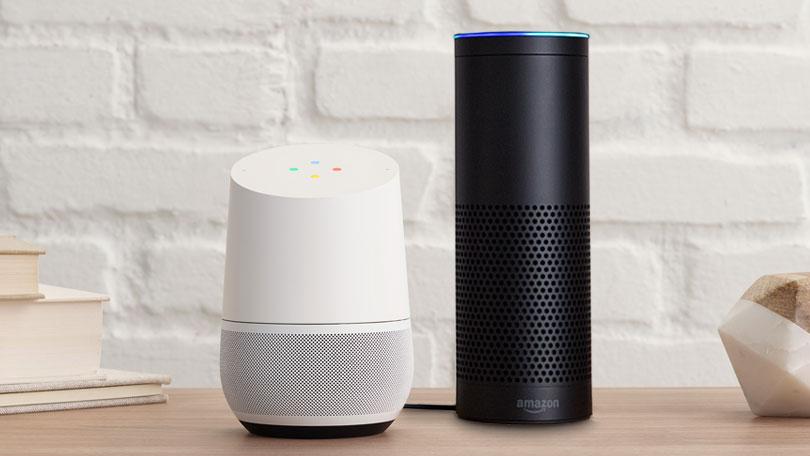
Further more. The smart column Google Home disappeared from the site - the only serious competitor to Amazon Echo (guess what began to appear instead of Google Home in the issuance of the site). Perhaps the Corporation of Kindness would like to respond to the impudent store, but it did not have adequate leverage. But they appeared in 2017, when the Amazon Echo Show, a smart column with a screen, was released in June. September 26, Google "without declaring war" banned this column from showing its YouTube. Neither Amazon nor the device users were warned about this. The formal reason is that the video was not shown as Google would like (without autoplay, display subscriptions, recommendations, comments):
The way Amazon showed YouTube violated our guidelines and created the wrong user environment.
The ability to watch videos from video hosting again appeared on the column in November. It turned out that Amazon itself did this, without any agreement with Google. She just released a “pirated” web version of YouTube, made by herself. With voice control instead of an interface, what Google called a gross violation of the terms of service.
Then Amazon stopped selling part of the Nest products for smart homes - an advanced thermostat, camera and alarm. Nest Labs has been owned by Google since 2014. The exact reason for eliminating products from the site is unknown, and it all looks rather strange: before Amazon even promoted this thermostat, Nest Thermostat E, as the “Best Choice” and gave the company's products a die “working with Alexa”. Experts have only one explanation: having finished removing Google’s products from its platform, Amazon took over its subsidiaries. Perhaps the calculation was that Google would give in and allow Amazon devices to work quietly with its services.

But Google, on the contrary, went on an escalation. A week after Amazon’s actions, it completely blocked YouTube’s smart column Echo Show for its part. And she announced that from January 1, 2018, video hosting will stop working on Fire TV set-top boxes. Google explicitly says that the new decision to block YouTube on competitor’s devices is due to Amazon’s reluctance to negotiate a partnership:
We tried to reach an agreement with Amazon, giving customers access to each other's products and platforms. But Amazon doesn’t sell Google products such as Chromecast and Google Home, it doesn’t open access to Prime Video for Google Cast users, and in the previous month it stopped selling some of the latest Nest products. Given this lack of interaction from Amazon, we would no longer support YouTube on the Echo Show and FireTV. We hope that we can soon reach an agreement to resolve these problems.
In the meantime, Amazon considers it "unfair" to block access to YouTube on its devices. In a statement, the company wrote that "We are saddened by Google’s decision to selectively restrict our users access to an open site." Meanwhile, Apple TV reappeared on Amazon.com. Apparently, the enemy of my enemy is my friend. Or Apple's Amazon is now on the list of "good boys."
AmazonTube
On December 20, it was discovered that Amazon had filed an application for registration of the AmazonTube and OpenTube trademarks. The ability to watch videos is the main “feature” of the Echo Show column, and the format of short YouTube videos was ideally suited for it. Without access to a good video hosting service, such a device does not make much sense, and, apparently, in order not to make concessions to the competitor, Amazon is thinking about creating its own. The description of the application states that AmazonTube will be "a service that provides non-downloadable, pre-recorded audio and video over wireless networks on a variety of topics of common interest."
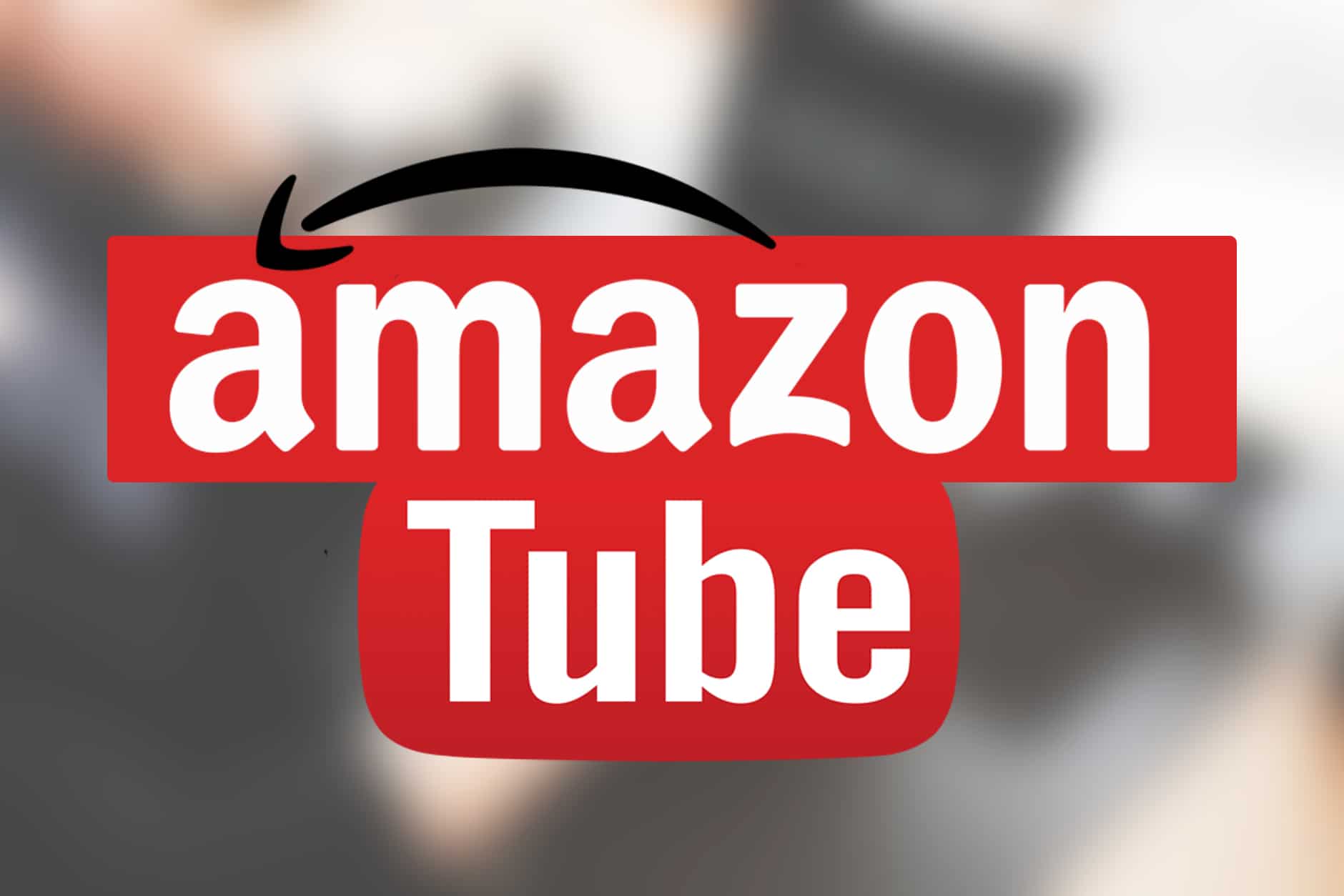
Experts doubt that Amazon plans to create a direct competitor to YouTube. Still, the company already has a similar working service - Amazon Video Direct , which Prime subscribers can watch content in. But the name AmazonTube seems to hint that the company is not afraid of rivalry with Google, and that it still has options. She even already registered the domains AmazonOpenTube.com, AlexaOpenTube.com and AmazonAlexaTube.com.
Attempts to “create an alternative to YouTube” may seem pathetic and ridiculous, but in the world of smart speakers is not so simple. When a person gives a command, he usually says something like "Alexa, show me the video with cats" or "Alexa, turn on the video with the sounds of nature." Which platform the content is coming from here is not so important. The main thing is that he is.
Confrontation at CES 2018
One of the main stories of the exhibition in Las Vegas, which was held from January 9 to 12, was the "battle" of Google and Amazon on the field of smart speakers and smart assistants. In 2017, Echo with Amazon Alexa was a breakthrough of the exhibition and its main news. But this time, Google did everything possible (and impossible!) To show that their development is not worse, but many even better. For starters, she spent a ton of money on an outdoor presentation. With pizza, dominoes, a coffee bar, video games and a slide for rolling, like the company has at its main office in Mountain View. The Hey Google panel was the most impressive and expensive at the show.
If before Google made deals at CES, worked with partners and held meetings, this year the strategy has changed. The whole of Las Vegas was flooded with giant advertising banners inviting you to look at what the company shows. And in the parking lot in front of the conference center, they built a three-story structure advertising the Google Assistant - in fact, Amazon’s only competitor, Amazon . With all the devices that this smart assistant is built into, from smart speakers and watches to kitchen utensils and Android Auto in Alfa Romeo parked nearby. All so that this year, discussions on CES revolved around Google, and not around Amazon.
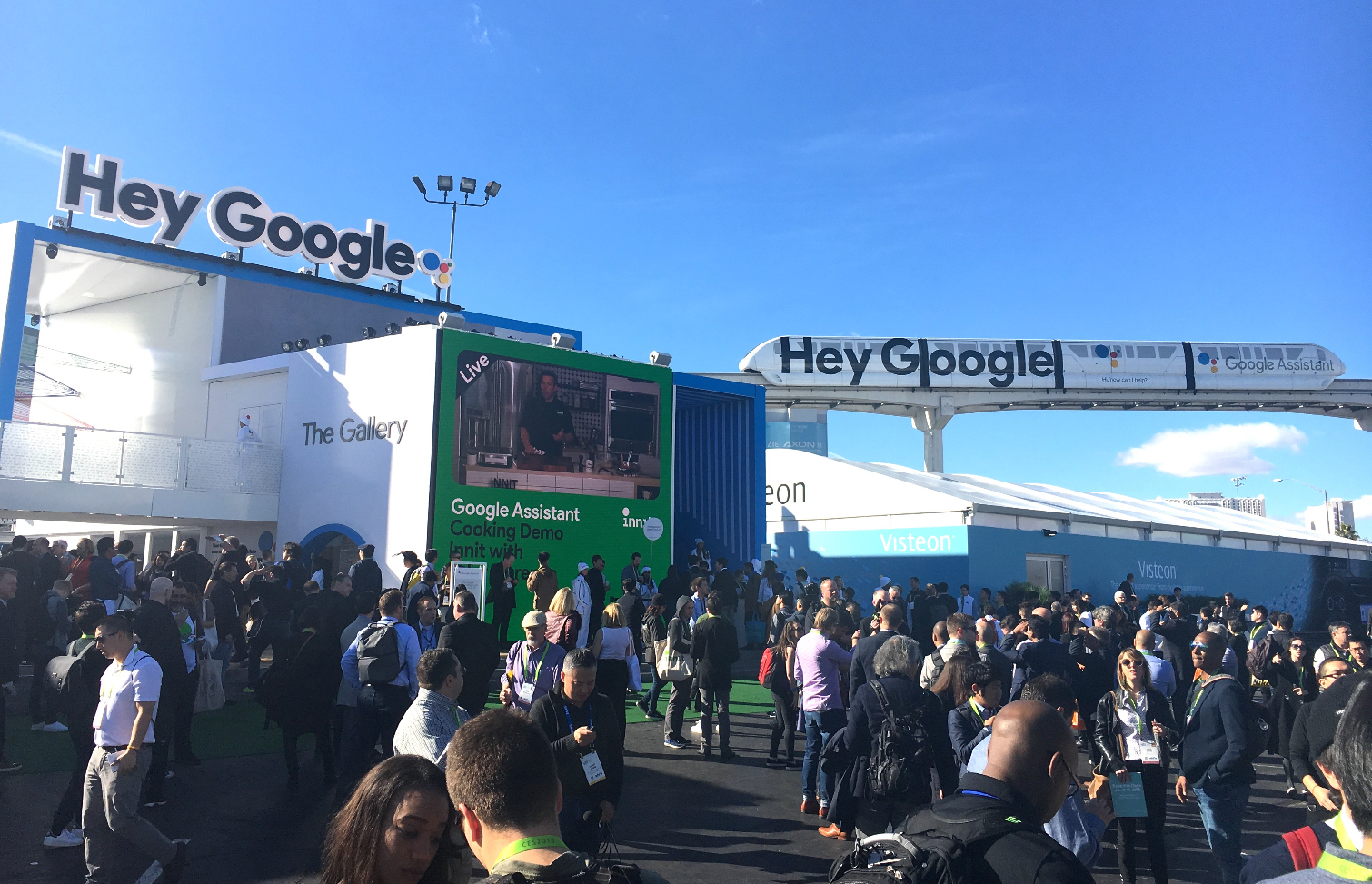
The funny thing is that Google did not show anything particularly interesting from technology. Everything focused on the idea of a “smart home”, where the Assistant connects all systems. Moreover, the “smart home” in Google’s view is just a building, all the devices in which are remotely controlled, without having to physically approach and press the button. Something proactive, such that without Google technology could not be done at all, was not presented - and this is at a time when special walking robots and exoskeletons are already being created for Alexa .
Amazon at CES 2018 had its own open-air area, closer to the epicenter of the exhibition. Much smaller than Google. Experts say Amazon stands out from a position of strength, so it’s not particularly invested in marketing. In the field of smart speakers, Echo / Echo Dot accounts for 88% of the market in the United States, Google's Home / Home Mini - 10%. Alexa is integrated into 4,000 products, Assistant into 1,500. But CES 2018 is universally held by Google. Although Alexa wins in America, the Google Assistant has more languages and more potential for overseas development. By the way, Apple, which wants to be the third in the market, lags behind the two leaders by more than an order of magnitude in terms of the number of sales and “skills” of its assistant.
Who is stronger
Of course, the parties will come to a compromise. Drowning in scandals is not profitable for any of the companies. But it’s funny to imagine “who is who” if the conflict continues to grow. In the style of the argument "who is stronger, Stallone or Schwarzenegger."
Let's compare financial indicators - after all, these are corporations whose main task is to generate money and dominate the market. In 2001, Amazon seriously overtook Google: its revenue was $ 3.1 billion compared to $ 0.1 billion from a search engine. Now the balance of power has shifted. At the end of 2016, Amazon received $ 136 billion in revenue, and Alphabet - $ 90.3 billion. Net profit of the main US store amounted to $ 2.4 billion, from a search engine - $ 19.5 billion. Both companies grow by 10-20% annually, although the latter for several years, Amazon is ahead in terms of revenue growth.
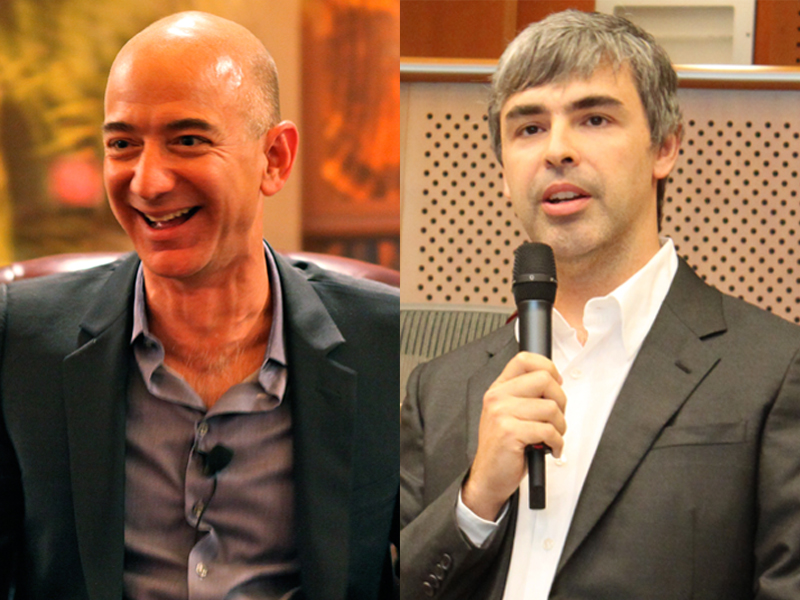
Founders, Jeff Bezos and Larry Page
Amazon and Google are among the top 5 global corporations, but their strategies are very different. Bezos, the world's leading billionaire, is investing all his money in new products and development, which is why Amazon shows almost no profit, often being in the red due to big purchases and investments. Google / Alphabet always gives a plus, usually 20% + of the total annual income, which gives the company a good airbag.
Amazon receives 59% of its store revenue in North America, 32% in other countries, and 9% of AWS cloud services. In Alphabet reporting, 99.1% came from Google, and 0.9% from Other Bets (including Nest, Fiber, Verily, Calico, Waymo, and so on). If you look at the total income, its growth rate and the level of diversification of assets, Amazon wins. But net profit is much higher at Alphabet.
Can Google bypass Amazon's total revenue in the future? Most experts think so. The difference between the companies is not so great. But can Amazon get around Google in terms of net profit? Probably not. Amazon’s infrastructure costs — warehouses, packaging centers, hundreds of thousands of employees, delivery services, etc. - will never leave and will not decline. To maintain its work, Google will always spend tens of billions of dollars less than Amazon, and therefore the profit from the search engine in the coming years will be higher. So in general, his position is stronger. Plus, Google has a “crown combo punch” if it bans all Amazon.com in its search results. It will almost certainly not come to that, but the consequences for Amazon would be disastrous.
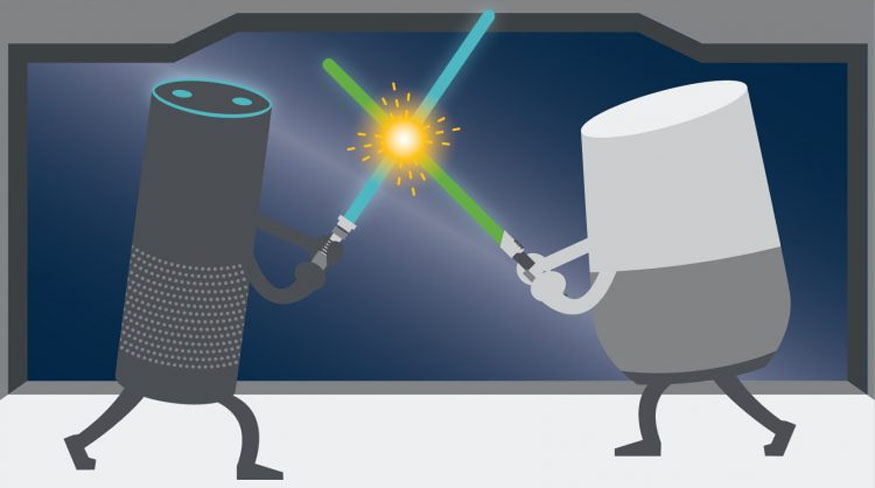
In the meantime, the most popular YouTube video hosting in the world is blocked for Amazon devices. And online shoppers cannot get Google and Nest products in the world's most famous store. The conflict between the two companies is reflected in their customers. As The Washington Post wrote, "Amazon and Google are at war, and that means we all lose as a result."
PS
Ordering Google and Amazon appliances, as well as gadgets, clothes, and even food, is often more profitable in the United States. And it is most profitable to bring goods from the USA to Russia with Pochtoy.com. Payment for a pound starts at $ 8.99. Everyone who has registered and entered the GEEKTIMES code receives from us $ 7 per account.
